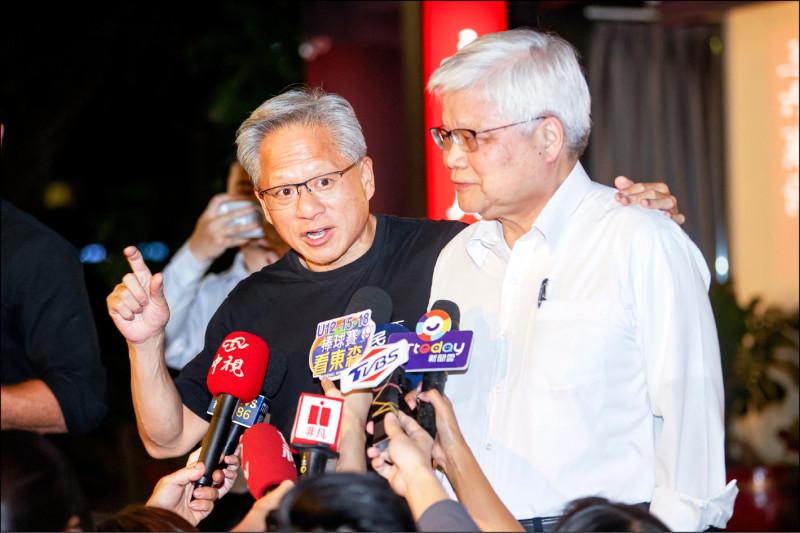Taiwan Semiconductor Manufacturing Co (TSMC, 台積電) today dismissed a local media report that claimed Nvidia CEO Jensen Huang (黃仁勳) visited Taiwan late last month to deliver a message from US President Donald Trump's administration.
TSMC said Huang, a Taiwan-born naturalized US citizen, came at the company's invitation to give an internal speech.

Photo: CNA
Chinese-language Mirror Media had reported that Huang's trip was aimed at pressing TSMC chairman C.C. Wei (魏哲家) to share profits on behalf of the Trump administration.
Citing industry sources, the magazine said that Nvidia and Advanced Micro Devices Inc (AMD) had agreed to hand over 15 percent of revenue from artificial intelligence (AI) chip sales to China to the US government in exchange for approval to sell controlled products in China.
Huang arrived in Taiwan by private jet on Aug. 22, spoke to TSMC executives at the company's research and development center in Hsinchu City, and attended a belated birthday celebration for TSMC founder Morris Chang (張忠謀).
He also joined Wei and other TSMC executives for dinner before returning to the US shortly afterward, ending a whirlwind visit that lasted about 13 hours.
TSMC today said that it has smooth communication channels with the US government and that the CEO of Nvidia — the world's largest company in terms of market capitalization as of last month — was invited by TSMC to give a speech.
On Aug. 22, Wei was asked about reported US government plans to take an equity stake in TSMC in exchange for subsidies.
"They have already announced that they will not take shares," he said.
At the time, TSMC stated there had never been any discussions of equity participation and that communication with the US government has been smooth and positive.

On Tuesday, US President Donald Trump weighed in on a pressing national issue: The rebranding of a restaurant chain. Last week, Cracker Barrel, a Tennessee company whose nationwide locations lean heavily on a cozy, old-timey aesthetic — “rocking chairs on the porch, a warm fire in the hearth, peg games on the table” — announced it was updating its logo. Uncle Herschel, the man who once appeared next to the letters with a barrel, was gone. It sparked ire on the right, with Donald Trump Jr leading a charge against the rebranding: “WTF is wrong with Cracker Barrel?!” Later, Trump Sr weighed

HEADWINDS: Upfront investment is unavoidable in the merger, but cost savings would materialize over time, TS Financial Holding Co president Welch Lin said TS Financial Holding Co (台新新光金控) said it would take about two years before the benefits of its merger with Shin Kong Financial Holding Co (新光金控) become evident, as the group prioritizes the consolidation of its major subsidiaries. “The group’s priority is to complete the consolidation of different subsidiaries,” Welch Lin (林維俊), president of the nation’s fourth-largest financial conglomerate by assets, told reporters during its first earnings briefing since the merger took effect on July 24. The asset management units are scheduled to merge in November, followed by life insurance in January next year and securities operations in April, Lin said. Banking integration,

LOOPHOLES: The move is to end a break that was aiding foreign producers without any similar benefit for US manufacturers, the US Department of Commerce said US President Donald Trump’s administration would make it harder for Samsung Electronics Co and SK Hynix Inc to ship critical equipment to their chipmaking operations in China, dealing a potential blow to the companies’ production in the world’s largest semiconductor market. The US Department of Commerce in a notice published on Friday said that it was revoking waivers for Samsung and SK Hynix to use US technologies in their Chinese operations. The companies had been operating in China under regulations that allow them to import chipmaking equipment without applying for a new license each time. The move would revise what is known

Artificial intelligence (AI) chip designer Cambricon Technologies Corp (寒武紀科技) plunged almost 9 percent after warning investors about a doubling in its share price over just a month, a record gain that helped fuel a US$1 trillion Chinese market rally. Cambricon triggered the selloff with a Thursday filing in which it dispelled talk about nonexistent products in the pipeline, reminded investors it labors under US sanctions, and stressed the difficulties of ascending the technology ladder. The Shanghai-listed company’s stock dived by the most since April in early yesterday trading, while the market stood largely unchanged. The litany of warnings underscores growing scrutiny of